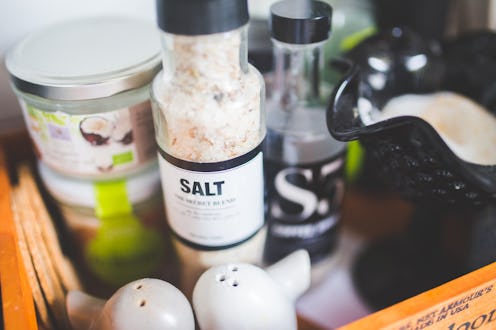Life
Salt In Moderation Might Have Some Unexpected Health Benefits
For many of us, a meal just doesn't taste right without an ample dash of salt to boost the flavor. But is salt bad for you? While it's true that there's plenty of evidence that not overdoing it is in our best interest, for all the negative press around this natural mineral, a recent re-examination of research has actually found some unexpected benefits to consuming it.
Of course, there's a lot of research showing that consuming salt in excess is not great for the human body. It can make us hold on to water, especially in the abdomen and cause bloating. The extra water in your blood is also known to raise blood pressure, which, in turn, places greater strain on your heart, arteries, kidneys, and brain, leading to an increased risk of heart attacks, strokes, dementia, and kidney disease.
How does all that happen? According to the Harvard School of Public Health, our kidneys typically struggle to keep up with excess sodium in the bloodstream. The buildup of salt encourages the body to hold onto water, which can both bump up the amount of fluid surrounding cells and create a higher volume of blood in the bloodstream — which then means additional work for the heart and added pressure on our blood vessels. And honestly, most of us are probably eating too much salt; The Harvard School of Public Health notes that Americans consume on average about 3,300 mg of sodium per day (three quarters of which comes from processed foods), even though according to the American Heart Association, most adults should limit their salt intake to 1,500 mg per day.
But although all of that is true, it turns out that there might be a good side to salt as well. A series of studies led by kidney specialist Dr. Jens Titze is rewriting the narrative the mineral, suggesting that our bodies can actually benefit from it in several different ways.
For the studies, which are published in two papers in The Journal of Clinical Investigation, Titze collected data between 1994 and 2006. He analyzed both the diets of Russian space crew members and mice, and what he found challenges a lot of what we think we know about how our bodies process salt. The first study found that the Russian space cadets, who were held in conditions designed to simulate space travel, reported that eating more salt actually reduced their thirst (rather than heightening it, as many of us probably would have suspected it would have), but also made them hungrier. The second experiment, meanwhile, related to the mice: According to the results, the rodents burned more calories when they consumed salt. Indeed, they even had to consume 25 percent more food in order to keep their weight the same.
Titze believes that the hunger effect in the space cadets was a result of an increased number of glucocorticoid hormones, which are said to impact metabolism. His findings confirmed that this hormone level increased as salt intake increased, breaking down fat and muscle and allowing the body to create its own source of water. Breaking down fat burns energy and therefore made the space cadets feel hungry.
Nor is Titze's research the only one that suggests we reconsider how we look at salt; 2015 study from Emory University in Atlanta also found that excess salt might not be linked to increased cardiovascular disease or heart failure as previously thought.
Salt actually has a pretty interesting history. It was used as a part of ancient Egyptian religious offerings, on top of having been a valuable commodity in trading for Phoenicians and the Mediterranean empire, which existed around 1200 BC. Sea salt company Salt Works' online history of the mineral notes that the word “salary” was even derived from the word “salt" — salt was actually given to Roman warriors as special rations, called "salarium algentum," just as money is used today. Who knew, right?
In any event, more research will definitely need to be carried out to unravel all the mysteries salt has stored away in its crystals. Looks like we'll have to take it all with a pinch of the white stuff in the meantime.
